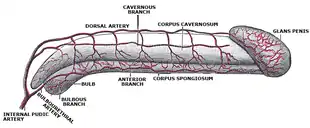Helicine arteries of penis
The helicine arteries of penis are arteries in the penis. They are found in the corpora cavernosa penis.[1]
| Helicine arteries of penis | |
|---|---|
 Diagram of the arteries of the penis. | |
| Details | |
| Identifiers | |
| Latin | Arteriae helicinae penis |
| TA98 | A09.4.01.024 |
| TA2 | 4351 |
| FMA | 75410 |
| Anatomical terminology | |
They are involved in the process of erection.[2]
Anatomy
On entering the cavernous structure from the deep artery of the penis the arteries divide into branches, which are supported and enclosed by the trabeculae. Some of these arteries end in a capillary net-work, the branches of which open directly into the cavernous spaces; others assume a tendril-like appearance, and form convoluted and somewhat dilated vessels, which were named by Rosenmüller "helicine arteries".
Clinical significance
These arteries have two unique features: an intimal cushion and valves. Sympathetic stimulation maintains a tonic contractile state of the intimal cushion, smooth muscle lying in the center of the artery. This keeps the artery coiled and little blood flow occurs, instead routing to arteriovenous shunts to the deep dorsal vein. Parasympathetic stimulation removes the tonic state and allows vasodilation of the intimal cushion. Blood now pools in the corpora cavernosa, resulting in erection. The valves prevent backflow in the now-tortuous route through the cavernosa.
This parasympathetic relaxation response is mediated by a release of nitric oxide (NO). NO binds to the enzyme guanylate cyclase, which results in increased levels of cyclic guanosine monophosphate (cGMP). cGMP in turn triggers relaxation of the smooth muscle and results in dilation of blood vessels. This signal is terminated when cGMP is broken down by the enzyme cGMP specific phosphodiesterase type 5 (PDE5), the enzyme that is targeted by sildenafil and other drugs that treat erectile dysfunction. By preventing PDE5 from breaking down cGMP, the effects of NO are amplified and vasodilation occurs, thus resulting in increased penile erection.
References
![]() This article incorporates text in the public domain from page 1251 of the 20th edition of Gray's Anatomy (1918)
This article incorporates text in the public domain from page 1251 of the 20th edition of Gray's Anatomy (1918)
- Böck P, Gorgas K (September 1977). "Morphology and histochemistry of helicine arteries in the corpora cavernosa penis of mice". Arch Histol Jpn. 40 (4): 265–81. doi:10.1679/aohc1950.40.265. PMID 597004.
- "helicine arteries of penis" at Dorland's Medical Dictionary